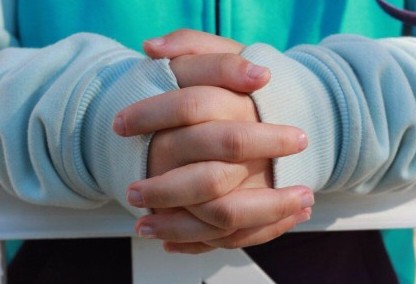Getting a Handle on Self-Harm
 Self-injury, particularly among adolescent girls, has become so prevalent so quickly that scientists and therapists are struggling to catch up. About 1 in 5 adolescents report having harmed themselves to soothe emotional pain at least once, according to a review of three dozen surveys i in nearly a dozen countries, including the United States, Canada and Britain. Read more ›
Self-injury, particularly among adolescent girls, has become so prevalent so quickly that scientists and therapists are struggling to catch up. About 1 in 5 adolescents report having harmed themselves to soothe emotional pain at least once, according to a review of three dozen surveys i in nearly a dozen countries, including the United States, Canada and Britain. Read more ›


 Discovering that a friend or relative self-harms can be extremely upsetting. It can be hard to understand why a person would deliberately hurt themselves, and people often go through a range of emotions, like feeling shocked, angry, saddened, confused or guilty.
Discovering that a friend or relative self-harms can be extremely upsetting. It can be hard to understand why a person would deliberately hurt themselves, and people often go through a range of emotions, like feeling shocked, angry, saddened, confused or guilty. 
 The
The 
 We all have ways of dealing with overwhelming negative feelings like stress, pressure, and even numbness. If someone deliberately hurts their own body as a way of dealing with their own negative emotions, they are engaging in non-suicidal self-injury, which is sometimes called “self-harm,” “deliberate self-harm,” or simply “self-injury.”
We all have ways of dealing with overwhelming negative feelings like stress, pressure, and even numbness. If someone deliberately hurts their own body as a way of dealing with their own negative emotions, they are engaging in non-suicidal self-injury, which is sometimes called “self-harm,” “deliberate self-harm,” or simply “self-injury.” 
 Hurting yourself—or thinking about hurting yourself—is a sign of emotional distress. These uncomfortable emotions may grow more intense if a person continues to use self-harm as a coping mechanism. Learning other ways to tolerate the mental pain will make you stronger in the long term.
Hurting yourself—or thinking about hurting yourself—is a sign of emotional distress. These uncomfortable emotions may grow more intense if a person continues to use self-harm as a coping mechanism. Learning other ways to tolerate the mental pain will make you stronger in the long term. 
 People deal with difficult feelings in all sorts of ways. They may talk with friends, go work out, or listen to music. But some people may feel an urge to hurt themselves when distressed.
People deal with difficult feelings in all sorts of ways. They may talk with friends, go work out, or listen to music. But some people may feel an urge to hurt themselves when distressed. 
 People with autism spectrum disorder (ASD) are at substantially increased risk of self-injury and suicide, according to a new study at Columbia University Mailman School of Public Health and Columbia College of Physicians and Surgeons. Researchers found that the odds of self-harm in people with autism spectrum disorder were over three times that of people without ASD.
People with autism spectrum disorder (ASD) are at substantially increased risk of self-injury and suicide, according to a new study at Columbia University Mailman School of Public Health and Columbia College of Physicians and Surgeons. Researchers found that the odds of self-harm in people with autism spectrum disorder were over three times that of people without ASD. 
 Everybody has those inner gremlins talking to them, bringing up the worst thoughts, second-guessing their instincts and being generally unkind.
Everybody has those inner gremlins talking to them, bringing up the worst thoughts, second-guessing their instincts and being generally unkind.
 School districts across the U.S. say they are seeing a surge of student misbehavior in the
School districts across the U.S. say they are seeing a surge of student misbehavior in the 
 Leslie Gonzalez’s path to becoming a doctor was filled with overwhelming pressure, stress and anxiety. Classroom struggles, the challenge of juggling a part-time job and schoolwork — Gonzalez labeled herself a failure. And on top of that, she felt the pressure of being one of the only Latinas in her medical school setting.
Leslie Gonzalez’s path to becoming a doctor was filled with overwhelming pressure, stress and anxiety. Classroom struggles, the challenge of juggling a part-time job and schoolwork — Gonzalez labeled herself a failure. And on top of that, she felt the pressure of being one of the only Latinas in her medical school setting. 

